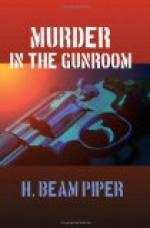“That’s a damn good circumstantial case, Jeff,” McKenna nodded. “Nothing you could take to a jury, of course, but mighty good grounds for suspicion.... You think Rivers could have been the fence?”
“He could have been. Whoever was higrading the collection had to have an outlet for his stuff, and he had to have a source of supply for the junk he was infiltrating into the collection as replacements. A crooked dealer is the answer to both, and Arnold Rivers was definitely crooked.”
“You know that?” McKenna inquired. “For sure?”
Another flash lit the front of the shop. Rand nodded.
“For damn good and sure. I can show you half a dozen firearms in this shop that have been altered to increase their value. I don’t mean legitimate restorations; I mean fraudulent alterations.” He went on to tell McKenna about Rivers’s expulsion from membership in the National Rifle Association. “And I know that he sold a pair of pistols to Lane Fleming, about a week before Fleming was killed, that were outright fakes. Fleming was going to sue the ears off Rivers about that; the fact is, until this morning, I’d been wondering if that mightn’t have been why Fleming had that sour-looking accident. If he’d lived, he’d have run Rivers out of business.”
“Hell, I didn’t know that!” McKenna seemed worried. “Fleming used to target-shoot with our gang, and he knew too much about gats to pull a Russ Columbo on himself. I didn’t like that accident, at the time, but I figured he’d pulled the Dutch, and the family were making out it was an accident. We never were called in; the whole thing was handled through the coroner’s office. You really think Fleming could have been bumped?”
“Yes. I think he could have been bumped,” Rand understated. “I haven’t found any positive proof, but—” He told McKenna about his purchase, from Rivers, of the revolver that had been later identified as the one brought home by Fleming on the day of his death. “I still don’t know how Rivers got hold of it,” he continued. “Until I walked in here not half an hour ago and found Rivers dead on the floor, I’d had a suspicion that Rivers might have sneaked into the Fleming house, shot Fleming with another revolver, left it in Fleming’s hand and carried away the one Fleming had been working on. The motive, of course, would have been to stop a lawsuit that would have put Rivers out of business and, not inconceivably, in jail. But now ...” He looked toward the front of the shop, where another photo-flash glared for an instant. “And don’t suggest that Rivers got conscience-stricken and killed himself. Aside from the technical difficulties of pinning himself to the floor after he was dead, that explanation’s out. Rivers had no conscience to be stricken with.”




